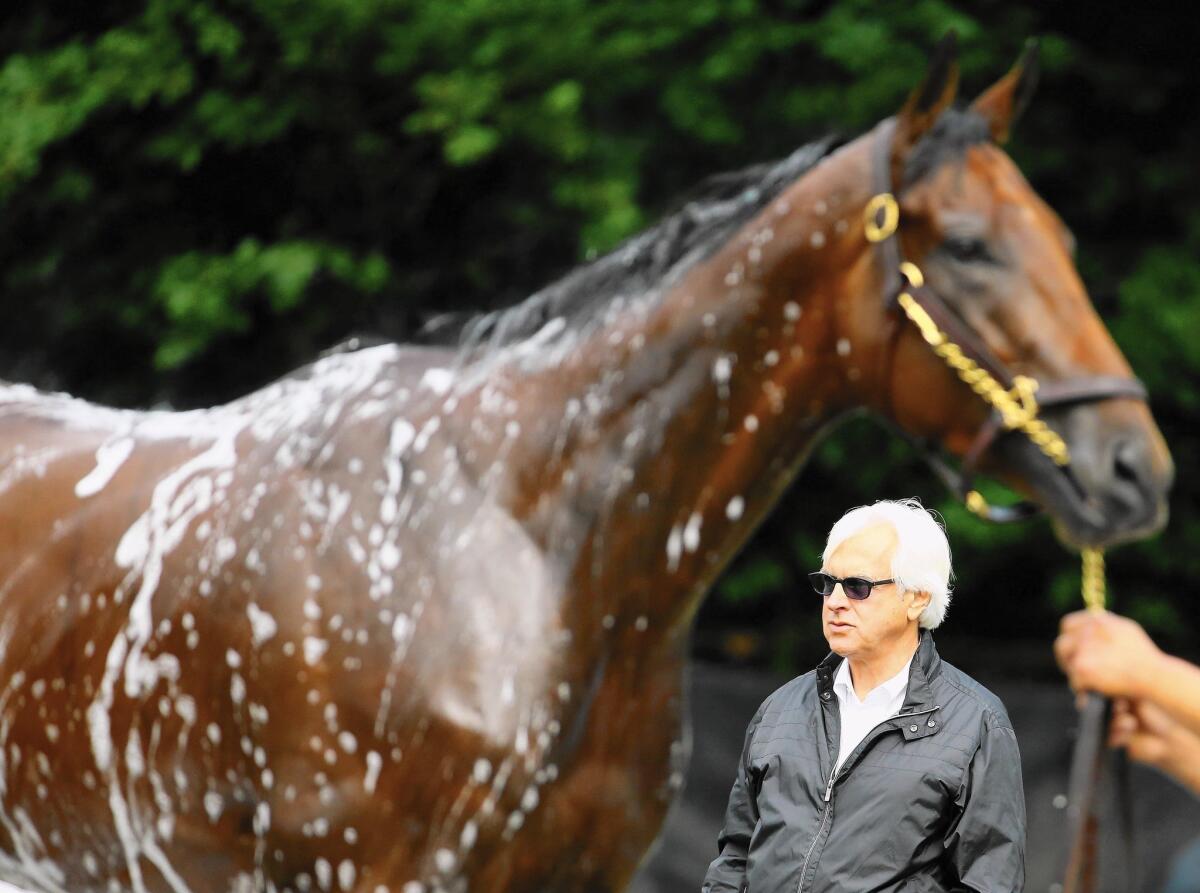Newsletter: Great Reads: The Triple Crown and the Flaming Lips
- Share via
Hi there. I'm Kari Howard, and I edit the Great Reads (a.k.a. Column Ones) for the Los Angeles Times.
Two of my biggest loves are narrative journalism and music, and I'm lucky that my days are filled with both: When reading the stories, I get inspired by songs I think fit the article's theme -- a soundtrack.
Here are this week's Great Reads, plus their soundtracks.
Back at home, still at war
As National Guard troops, the men of Charlie Troop embody a myth rooted deeply in American history: that its wars should be fought by citizen-soldiers who return to their old lives, jobs and families once the fighting is over. But returning to their old lives in Michigan after a terrible ambush in Afghanistan hasn't been easy. The only time they feel truly at ease, many of them say, is when they are back together.

Eric Lund, a former sergeant with the Michigan National Guard’s Charlie Troop, survived a roadside bombing in Afghanistan in 2012, but the turret of his overturned armored vehicle crushed his arms.
Eric Lund survived a roadside bombing in Afghanistan in 2012. (Katie Falkenberg / Los Angeles Times)
The soundtrack: "In the Dark Places," by PJ Harvey. From the stunning antiwar album "Let England Shake," this was my go-to song when I was on the Foreign Desk and editing stories from the wars in Afghanistan and Iraq.
The nerd's guide to Shanghai dumplings
Like me, you may have spent a good chunk of a Sunday morning waiting in line for dumplings at Arcadia's famous Din Tai Fung restaurant. But you probably weren't carrying an electronic scale accurate to 1/100th of a gram, digital calipers capable of measuring 1/100th of a millimeter and a set of 140-millimeter shearing scissors. That's what expat chef-turned-food-writer Christopher St. Cavish does when he dines out on dumplings in Shanghai. He uses them to probe the thinness of the dough, the volume of the soup and the weight of pork meatballs to rank the best xiao long bao in the city.

Chef-turned-food-writer Christopher St. Cavish, at Zun Ke Lai restaurant in Shanghai, demonstrates how a dumpling droops when picked up.
Chef-turned-food-writer Christopher St. Cavish. (Nick May / For The Times)
The soundtrack: "Weights and Measures," by the Happy Bullets. I'd never heard of this band but love the jangle-pop meets punk of the chorus.
The 6th Street Viaduct as Rorschach test
Tom Curwen has the rare ability to make engineering seem lyrical. He's done two stories now on the bridges of L.A. The first, about an early 20th century bridge engineer, has a noirish feel. The latest, about the reboot of the iconic 6th Street Viaduct, has this wonderfully elegant line: "A raceway for car chases, a backdrop for crime dramas, a blank slate for automotive ads, it is the city's most subtle Rorschach, a subliminal presence on the edge of the urban consciousness."

A model of the new viaduct sits near the current bridge, which spans the Los Angeles River. The old bridge stands as a nostalgic wreck. Wooden planks span broken balustrades. Graffiti tags mark the high iron arches. Pigeons befoul the crevices.
A model of the new viaduct sits near the current bridge. (Irfan Khan / Los Angeles Times)
The soundtrack: I was tempted, but only briefly, by "Under the Bridge," by the Red Hot Chili Peppers. Instead, I chose a song I actually like: "Look on Down From the Bridge," by Mazzy Star, with that classic Mazzy Star feeling of being underwater as you listen to the song.
$770,000 funerals and exotic dancers
During Mao Tse-tung's reign, Chinese funerals culminated in a short speech by the head of the deceased's work unit praising the departed's contributions to socialism. Few lasted more than 15 minutes. That's so 1975. Today, China is an economic superpower, and ostentatious funerals have made a massive comeback. My favorite is the entrepreneur who spent $770,000 to see off his mother with massive LED screens, a 100-piece orchestra, a line of gold-painted cannons and a fleet of Lincoln limousines. But a close second is the funerals where villagers employed exotic dancers to attract large crowds.

Guests are invited to check out a coffin at a funeral expo in Hong Kong in 2009. (Mike Clarke / AFP/Getty Images)
The soundtrack: "Funeral Singers," by Califone. From the album "All My Friends Are Funeral Singers." Recommended. And the home-movie vibe of the video is grand. (Speaking of their videos, this is one of my favorites for the story it tells.)
The Susan Lucci of the Triple Crown
Bob Baffert is a rock star in the world of horse racing, instantly recognizable by his silver hair and the dark sunglasses he wears, even on a cloudy morning. He's one of the winningest trainers in the sport, but one thing has stymied him: the Triple Crown. Three times he's gone into the Belmont Stakes with a potential winner, and three times he's come up short. Today, he hopes the fourth time is the charm. Love this quote: "If a horse loses, I’m moody."

Bob Baffert looks on as American Pharoah gets bathed after training at Belmont Park this week.
Bob Baffert looks on as American Pharoah gets bathed after training at Belmont Park. (Al Bello / Getty Images)
The soundtrack: "Race for the Prize," by the Flaming Lips. This band is brilliantly weird. In addition to their offbeat original pop, they re-create famous albums, including my beloved Stone Roses. (Which is impossible to find -- if anyone reading this has it, please let me know!)
What I'm reading
I left my Nancy Drew days behind years ago (although I did find one in a used bookstore recently, bought it for nostalgia's sake and was shocked by how poor the writing was). Now the Atlantic tells me that the Nancy Drew and Hardy Boy series are still being written, by an army of ghost writers. "You have to keep feeding the machine," one editor says.
The California Sunday magazine is a reliable source of great reads, and this one about a "Pied Piper of true-crime nerds" and a mysterious man who was found dead on an Australian beach in 1948 is totally absorbing, with a twist at the end.
What's on my bedside table
"The First Collection of Criticism by a Living Female Rock Critic," by Jessica Hopper. I mentioned last week that I had just picked it up, and now I have to update: The opening essay about what music means to her is worth the price alone. Not only does it reference one of my favorite lyrics -- "would you be an outlaw for my love," from Big Star's "Thirteen" -- but it has a feverish Lester Bangs style that's grand.
What's on my turntable
Although I spend most of my time listening with headphones to Spotify, sometimes I want to hear the needle touching down on vinyl. That’s why I have a turntable in my office -- and two at home (one inside, and a battery-powered one outside when the weather’s fine --which it usually is in Southern California). This week’s vinyl: "Wattstax: The Living Word." I wish I'd been around to go to this 1972 festival at the Coliseum. The Staple Singers, Carla Thomas and, be still my heart, Isaac Hayes.
Want to chat? Have a great idea for a Great Read? I'm @karihow on Twitter and kari.howard@latimes.com on email.
Sign up for Essential California
The most important California stories and recommendations in your inbox every morning.
You may occasionally receive promotional content from the Los Angeles Times.







